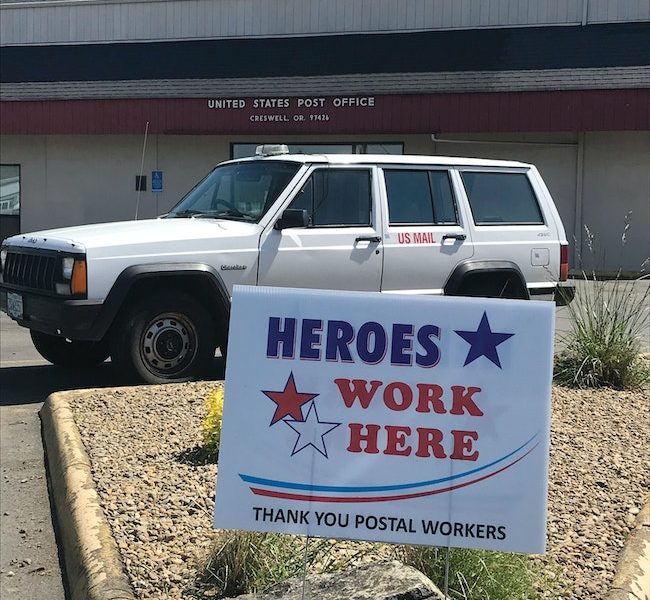 USPS employees and area residents are concerned about the long-term prospects of the post office.
USPS employees and area residents are concerned about the long-term prospects of the post office.
CRESWELL – The thought of the U.S. Postal Service ceasing to exist is troubling enough for small and rural communities. In a town named after one of the country’s legendary postmaster generals, it stings a little harder.
Creswell, after all, is named after Postmaster General John Andrew Jackson Creswell, who was appointed by President Ulysses S. Grant in 1869. Creswell enjoyed a sterling reputation as Postmaster General; he oversaw expansion of western routes, implemented efficiencies to make the service more competitive worldwide, and championed integration of African-American men and women into postmasters across the country.
Of course, that’s ancient history today.
Right now, Creswell postmaster Wendy Lentz is focused on serving a community relying on “the last mile” of delivery for medicine and other essential products, as well as the usual cards and letters. “USPS is my life and I take representing it very seriously,” Lentz said.
And for good reason. Peoples’ lives depend on postal deliveries.
“The last mile” is an industry phrase for that final stretch of delivery to your home. In rural and small towns, it’s often handled by the local USPS after the online retailers drop off the packages. The fact is USPS delivers more e-commerce packages to U.S. homes than any other shipper.
The United States Postal Service – and the Creswell branch – are operating under a financial cloud these days that could cause it to shut down by late summer.
Why is the post office struggling financially? Congress passed a law in 2006 that prevented the postal service increasing rates for regular mail by more than the Consumer Price Index. As Casey Cep wrote in The New Yorker last week, “This change meant that, no matter the spike in fuel prices for the agency’s vehicles, leases for its cargo flights, health insurance for its workers, or any other operating expense, the agency could not charge more than a few additional cents for its services every year. That’s why your stamps still cost only fifty-five cents, and package-shipping rates are so much less than private alternatives.”
And this same law required USPS to pre-fund its employee pension and retirement funds, including health care, for the next 75 years.
The year that mandate passed, the USPS had $900 million in profits. It has not had a profitable year since. To be clear, USPS is a self-funding entity, and does not receive tax revenue to support its operations.
Su Liudahl, director of the Creswell library, said the potential privatization of the mail-delivery business could cripple many rural businesses.
“As a rural community, although we’re not as remote as some, we really benefit from the services available through the post office,” said Liudahl, who also serves on Creswell First’s board. “The library makes heavy use of the post office for deliveries and interlibrary loans during summer when the courier isn’t operating.
“The increased costs would affect our budget to the point we would probably have to reduce new book purchases. It would also impact our online book sales through the Friends of the Library and our fundraisers for Creswell First.”
Gina Fritz of Harvey’s Selective Logging was visiting the Creswell office Tuesday afternoon. The Creswell resident said she uses the post office for buying and shipping parts that are essential for her business. “It would be a big loss if the post office closed; I’m not sure how our business would handle it.”
Karen Leslie, a retiree and Creswell post office regular for 25 years, said she’s concerned for elderly shut-ins getting what they need if delivery is eliminated or costs go up. Plus, she likes holding mail.
“I’m tactile, I like getting my mail in my inbox. I like touching things,” she said. “I also wonder how it would impact our businesses nationally and locally. We’re all very wrapped up in the post office for business economy.”
Liudahl said the business concerns are real – and the effects on personal interactions are equally real.
“My greatest concern is the way it would impact rural residents in particular,” she said. “This is one of those situations where the government works to the benefit of all by making equal service available to all.
“Because the efficiency of delivery in cities keeps USPS service affordable to all of us, we can all still afford to send a Mother’s Day card to Grandma, vote by mail equally, or ship some cookies to our daughter in the military overseas. I believe that the USPS is a bargain and necessary for democracy.”
At least one person who spoke with The Chronicle was less than sympathetic. Dave Munday, a retired trucker and Creswell resident, said his experiences with USPS throughout his driving career were less-than-positive.
He cited logistical and fiscal issues in how USPS operated when he sometimes worked as a contract driver around holidays. “It’s the worst-run organization in the world,” he said.
USPS officials acknowledge the previous inefficiencies and broken business model on their website. “These business-model problems are serious, but solvable,” it states.
“An open and transparent review process in which the perspectives of all stakeholders are fully represented will allow development of postal reform proposals to benefit American businesses and consumers alike.”







